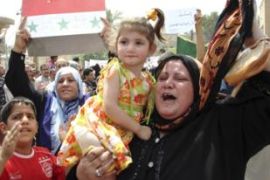US to ‘respect Iraqi view’ on wall
Al-Maliki says he wants the building of the wall in Adhamiyah to stop.

“I’m not sure where we are right now concerning our discussions on how to move forward on this particular issue,” Crocker said.
But he defended the principle behind the Adhamiyah wall, saying it was aimed at protecting the community, not segregating it.
As he spoke, hundreds of Iraqis took to the streets in the area in northern Baghdad to protect the wall’s construction, which residents have complained would isolate them from the rest of the city.
Crocker said the intention of the barrier in Adhamiyah as well as those constructed around markets in the capital is “to try and identify where the fault lines are and where avenues of attack lie and set up the barriers literally to prevent those attacks.”
“It is in no one’s intention or thinking that this is going to be a permanent state of affairs.”
Criticism
Al-Maliki said he has ordered a halt to the US military construction of the wall on Sunday in Cairo, Egypt as he began a regional tour to shore up support from mostly Sunni Arab nations for his Shia-dominated government.
The US military announced last week that it was building a 5km-long and 3.6 metre tall concrete wall in Adhamiyah, a Sunni stronghold whose residents have often been the victims of retaliatory mortar attacks by Shia fighters following bombings usually blamed on Sunnis.
US and Iraqi officials defended plans for the barrier as an effort to protect the neighbourhood, but residents and Sunni leaders complained it was a form of discrimination that would isolate the community.
Lieutenant Colonel Christopher Garver, a US military spokesman, declined to comment on whether construction of the wall would stop, saying only that all security measures were constantly under discussion.
“We will coordinate with the Iraqi government and Iraqi commanders in order to establish effective, appropriate security measures,” he said.
The Sunni Iraqi Islamic Party had denounced the wall’s construction earlier on Sunday.
“Isolating parts of Baghdad with barbed wire and concrete barriers will inflict social and economic damage and it will lead to more sectarian tension,” it said.
“This measure will harm the residents and it will have a negative impact on the areas instead of solving the problems.”
Aides to al-Sadr also criticised the barrier as an “unacceptable” move by the United States, saying they feared Shia areas in Baghdad like Sadr City would be next.